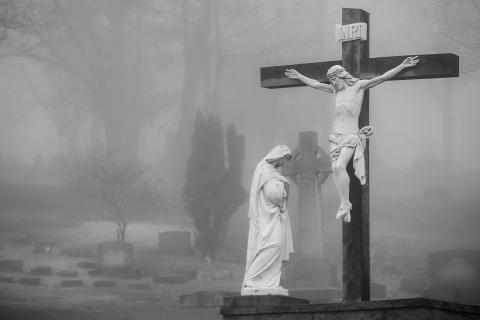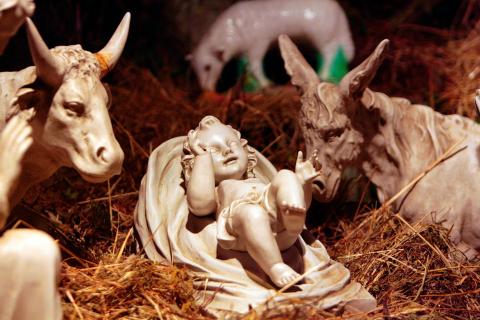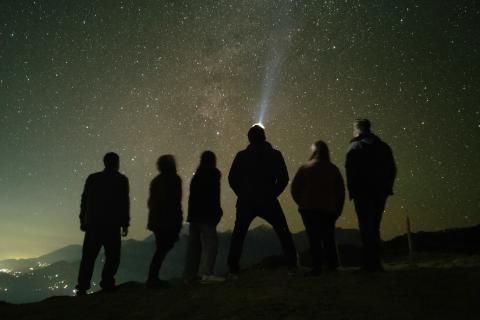
Today, September 29th, is the feast of the Archangels Michael, Gabriel, and Raphael. These archangels are each named in Scripture. Among St. Michael’s many patronages are that of soldiers, police officers, paramedics, the grace of a holy death, and protection in the midst of temptation; St. Gabriel’s include messengers and communication workers; St. Raphael’s include healthcare workers, mental and physical healing, travelers, and finding one’s spouse.
Belief in angels is a topic that has likely never been raised in an American presidential debate and seldom rises above the level of quaint expression. But the belief in invisible warriors – potentially embarrassing in secular Western society – is a dogma of the Catholic faith. Beyond being a required aspect of the Catholic faith, the belief in angels (and demons) also exposes the foolishness of “sophisticated,” materialistic societies: scientism, the insistence that only that which can be seen and sensed can be real, and the social engineering that has arisen accordingly have not quite led to the human flourishing predicted. Consider the following critique of such a limited worldview:
“There has perhaps never been a culture so caught by pride of mind as the modern West. Our technological ability to manipulate the material world surpasses anything before known, and we have become convinced that our cleverness holds all the answers to life. It should therefore come as no surprise that there has perhaps never been a human society so ignorant of invisible realities as our own. We have relegated God, the one who holds creation in being from moment to moment and whose plans and providence rules all things, to a harmless and doubtful personal hobby for those who might wish it. We hold the angelic order that exercises a momentous influence on all things human to be nothing but a fairy tale, and the malicious and powerful being whom Jesus called “the Prince of this world” is left entirely and unwisely out of account. The immortal human soul, meant for a divine destiny with God, has been denied existence, and we have reduced the human creature in all its mystery and complexity, with its loves, hopes, sufferings, desires for goodness and justice, intimations of immortality, to an accidental occurrence of random and meaningless matter and force. We are living in an age of great cleverness that has been caught by profound folly” (“Wisdom, Foolishness, and the Invisible World”).
As we pursue truth through our senses and intellectual labor, strive after virtue, and embrace the life of Christian discipleship, perhaps it’s time we entrust our aspirations to the authority of our invisible allies. In doing so, we may just discover that what is most true about us is invisible and non-measurable, as well.
The smiling angel of Reims inspired hundreds of years of the depiction of angels and still gazes joyfully on today.
Appreciating both the handiwork of God and the arts, the Christian tradition has long recognized the power of beauty. What do some of the greatest minds of the tradition have to say about beauty?
Speaking of invisible realities, did the intellectually sophisticated Romans actually believe in their gods?
In another sign of the increasing infantilization of adults in our culture, McDonald’s has unveiled new Happy Meals for adults. Under the pretense of nostalgia, such signs increasingly allow us to flee from our responsibilities and authentic loves in the present moment toward what we perceive to be emotionally safe and rewarding.
In the legal world, Supreme Court Justice Samuel Alito, author of the opinion that overturned Roe v. Wade, recently spoke on faith and the legal profession at the Catholic University of America. Alito affirmed his belief that one’s faith should affect how one treats people, and that judges should keep in mind that their decision impact real people.
Catholic legal scholar Helen Avaré’s new book, Religious Freedom After the Sexual Revolution, offers an intelligent, faith-based approach for Christian institutions to stand up for their faith and identities in the midst of a secularizing culture.
Abroad, Italy’s newly-elected and first female Prime Minister, Giorgia Meloni, has been described as everything from “pro-family” to “fascist.” What does Meloni stand for, and what does her election mean for Catholics in Italy?
In a recently-liberated city in Ukraine, the words of the “Our Father” were found etched in Ukrainian on the wall of a Russian torture dungeon. A Catholic author explores the insights on forgiveness and Divine Mercy that have arisen within the violent and bloody experiences of Eastern Europe over the last century.
An author reflects on how physical movement and exercise may play an overlooked role in our fulfillment of God’s plan for our lives.
Finally, a pro-life crisis pregnancy center in Texas helped to reunite Afghan refugees with their baby, a year after he and his grandmother were separated from them while attempting to leave the country. 22-month-old Jasoor arrived in the United States and walked into his parents’ arms on Tuesday.


